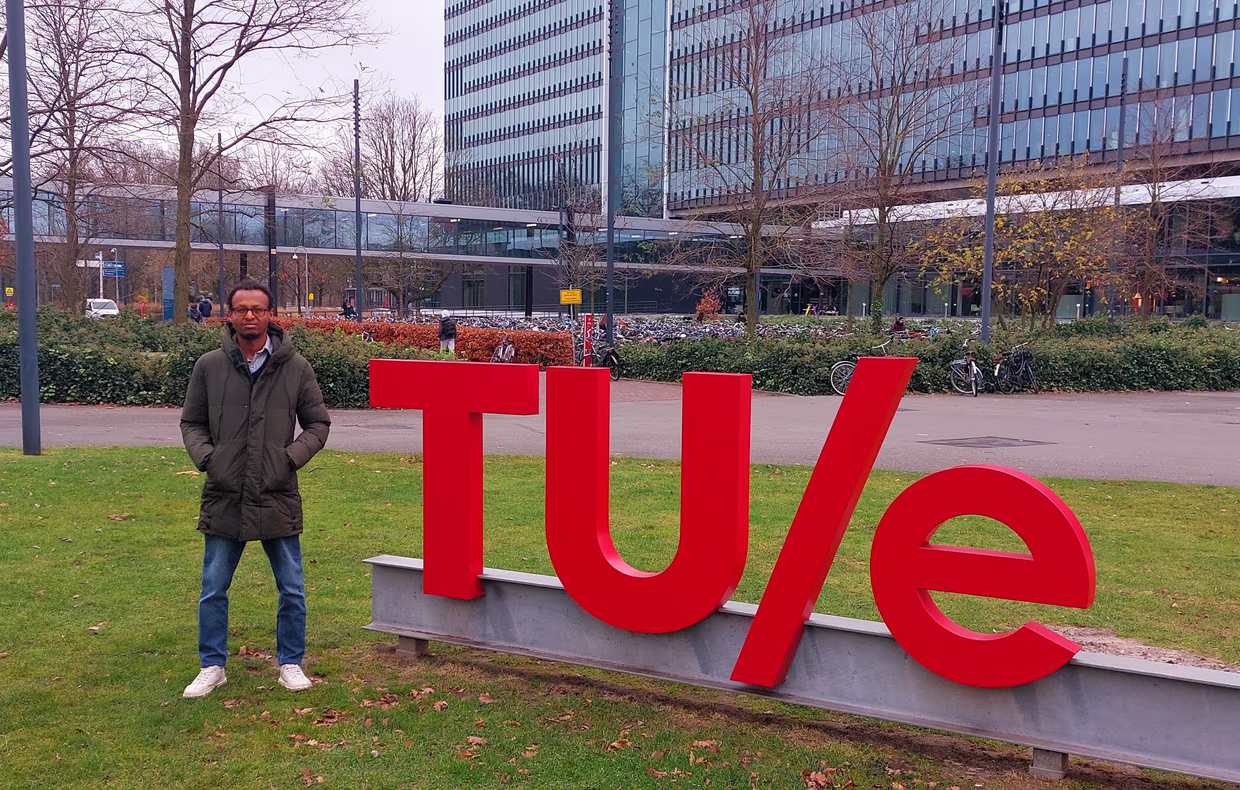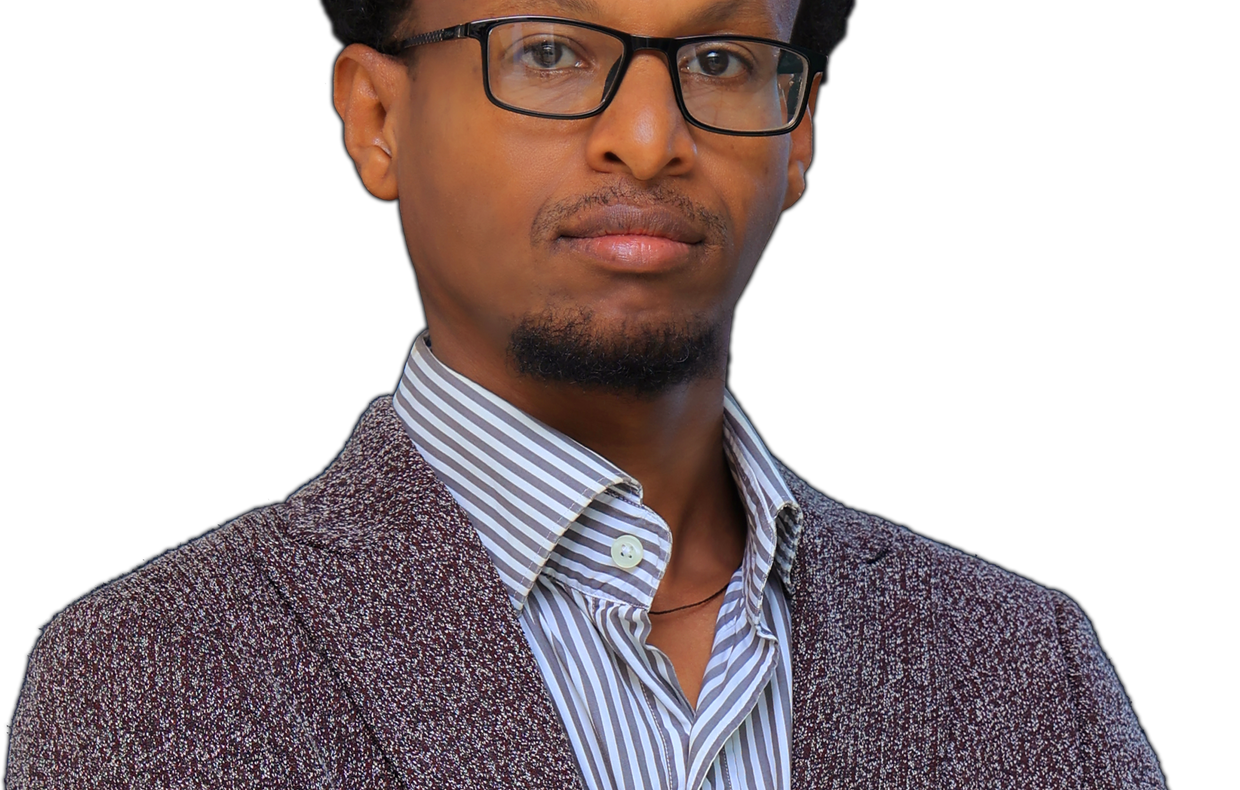Research Topic: "Emulation of multi-path propagation using reverberation chamber"
Background:
I am Eyob Mersha Woldamanuel, and my journey as an engineer and educator has taken me from the historic city of Harar, Ethiopia, to the forefront of cutting-edge research. My academic foundation began with a BSc in Electrical and Computer Engineering from Haramaya University in 2014, which ignited my passion for communication technologies. I continued my studies by earning an MSc in Electronics and Communication Engineering from Adama Science and Technology University in 2019. For over five years, I have had the privilege of shaping the next generation of engineers at the School of Electrical and Computer Engineering, Haramaya Institute of Technology, Haramaya University, where I taught courses such as Introduction to Communication Systems, Digital Communications, Wireless and Mobile Communications Systems, and Microelectronic Devices and Systems, while also co-supervising BSc and MSc students. My commitment to advancing knowledge extends beyond the classroom, as demonstrated by my research publications in esteemed journals, including those from Springer, IEEE, and Wiley. Currently, as I pursue my PhD, I am dedicated to expanding my expertise in electromagnetic compatibility (EMC), building on my extensive background in communication engineering.
How did you become a part of NEPIT?
During a long and determined search for a PhD opportunity at a leading European university, I came across a vacancy for the Doctoral Candidate (DC09) position within the NEPIT (Network for the Evaluation of Propagation and Interference Training) project. After waiting more than four years for a program that truly aligned with my academic interests and career aspirations, this opportunity stood out as an ideal match. At the time, I was serving as a lecturer at the School of Electrical and Computer Engineering, Haramaya Institute of Technology, Haramaya University, while actively exploring PhD openings that would allow me to further develop my expertise in communication systems.
Driven by my background in communication engineering, I chose the DC09 position as my top preference, believing it aligned closely with both my skills and long-term goals. I was delighted to be shortlisted for an interview, which took place on Friday, April 12, 2024, my very first experience with a PhD interview. Despite a brief technical issue that caused me to be five minutes late and slightly nervous, the interview turned out to be a positive experience. I vividly remember asking the interview coordinator, Dr. Ramiro Serra, who I later discovered would become my supervisor, about the work environment and the expected outcomes of the PhD, driven by my genuine curiosity and excitement about the project.
Shortly afterward, on May 8, 2024, I received a conditional offer, a moment of immense happiness that I immediately shared with one of my closest friends. It was a day I will always cherish. On September 2, 2024, I officially relocated to Eindhoven, Netherlands, and joined the NEPIT project at Eindhoven University of Technology (TU/e). Looking back, I can confidently say that applying to NEPIT and joining TU/e was the right decision. The years of perseverance and patience ultimately led me to an academic environment where I can thrive, grow, and contribute meaningfully to the field of electromagnetic compatibility.
What is NEPIT according to you?
As the world becomes increasingly dependent on electronics and wireless systems, addressing the challenges of electromagnetic compatibility (EMC) and electromagnetic interference (EMI) is more urgent than ever. The risks associated with EMI are substantial; consider, for instance, the potential hazards in a modern surgical room filled with sensitive medical equipment or the catastrophic consequences of EMI disruptions in widespread deployment of self-driving cars, which rely extensively on complex electronic and wireless technologies. Ensuring public safety and the reliability of such technologies demands robust and advanced EMC testing methods. Crucially, this testing must occur in environments that realistically emulate the chaotic electromagnetic conditions found in real-world settings, not idealized free-space environments like Anechoic Chambers (AC). Reverberation Chambers (RCs), which simulate these complex wave interactions more accurately, offer a more effective testing environment. Supporting this vision, the Network for the Evaluation of Propagation and Interference Training (NEPIT) project trains engineers like me in cutting-edge EMC techniques, promotes collaboration across top European universities and industry partners, and aims to establish the RC as the standardized facility for comprehensive EMC testing.
Role in NEPIT?
As a PhD candidate within the NEPIT project, my research focuses on the emulation of multipath propagation using reverberation chambers (RCs). Modern electronic systems, whether in vehicles, aircraft, medical facilities, or offices, often operate in semi-enclosed environments where electromagnetic fields undergo multiple reflections, creating highly complex propagation conditions. Traditional deterministic models fall short in predicting field behavior in such scenarios. My research aims to recreate these realistic, semi-reverberant environments in the laboratory using RCs, enabling more accurate electromagnetic interference (EMI) testing. This approach ensures that electronic systems are evaluated under conditions that closely reflect their actual deployment environments, supporting better reliability and coexistence in the real world.
Plans for immediate and distant future?
My long-term aspiration is to become a leading academic researcher and expert in electromagnetic compatibility (EMC), advancing the scientific foundations of EMC testing and mitigation techniques for wireless devices and systems. I am deeply committed to addressing complex engineering challenges through rigorous research, high-quality publications, and meaningful academic contributions. In the short term, my focus is on publishing peer-reviewed journal articles in IEEE and submitting papers to EMC Europe within the coming few years, alongside completing my PhD on schedule. I also intend to actively participate in academic conferences and workshops to build collaborations and exchange knowledge within the global EMC research community". Through these efforts, I aim to advance the academic body of knowledge in EMC while bridging the gap between research and practical applications, ultimately making a lasting impact in both academia and industry.



